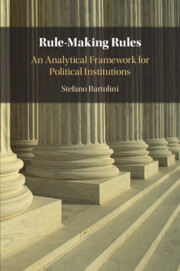Book contents
- Rule-Making Rules
- Rule-Making Rules
- Copyright page
- Dedication
- Epigraph
- Contents
- Figures
- Tables
- Acknowledgements
- Introduction
- Part I On Institutions
- 1 The Origins of Institutions
- 2 Approaches to Institutions
- 3 A Framework for Institutional Analysis and a Typology of Institutions
- Part II On Political Institutions
- References
- Index
3 - A Framework for Institutional Analysis and a Typology of Institutions
from Part I - On Institutions
Published online by Cambridge University Press: 16 June 2022
- Rule-Making Rules
- Rule-Making Rules
- Copyright page
- Dedication
- Epigraph
- Contents
- Figures
- Tables
- Acknowledgements
- Introduction
- Part I On Institutions
- 1 The Origins of Institutions
- 2 Approaches to Institutions
- 3 A Framework for Institutional Analysis and a Typology of Institutions
- Part II On Political Institutions
- References
- Index
Summary
Chapter 3 first discusses separately and in an analytical way the main properties of the institutions identified by the different approaches reviewed in Chapter 2. The property space of the term ‘institution’ is unpacked in the following set of analytical properties: stability, normativity, sanctionability, enforcement, layering, intentionality, endogeneity and efficiency. In the second part of the chapter, I propose a typology of different institutions based on the values these properties have. This exercise allows inherent and constitutive difficulties in institutional analysis to emerge. It is necessary to take a clear stand on these problems and to try to disentangle the definitional maze. The chapter concludes by discussing the fundamental difference between ‘norms’ and ‘rules’ and suggests a line along which this can be established.
Keywords
- Type
- Chapter
- Information
- Rule-Making RulesAn Analytical Framework for Political Institutions, pp. 77 - 116Publisher: Cambridge University PressPrint publication year: 2022



